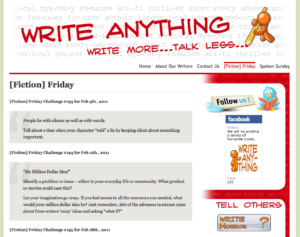The Author’s Guild last week declared that no contract should offer an author less than 50% royalties on ebooks[2. They seem to have <a href=”http://www.authorsguild.org/advocacy/articles/the-e-book-royalty-mess-an-interim.html”>modified</a> their stance a little].
15 years ago, it was rare to see a number larger than 12.5% in any publishing contract for primary rights. It was common to see 10% or 7.5%.
How Did We Get From 7.5% to 50%?
Let me tell you a little story about the ancient days of the Internet.
In 1997 John Feldcamp, a digital printing guy and Chris Kelly, a finance guy, decided to set up Xlibris as an ebook and print on demand service (the first time anyone had figured out how to offer true POD services directly to authors) .
In 1998, they hired me to help them change the world. Whatever else Xlibris became or did right or did wrong, it was founded — and operated for a long time — on the burning beliefs that:
- No-one had the right to tell any writer to sit down and shut up.
- We were going to help every writer master the new methods of delivery technology was opening up to them.
- We did not deserve any ownership of their intellectual property in exchange for helping them distribute it.
- The author should get 50% of the proceeds[2. On print books 50% of the profit was a lot less than 50% of the list price, which is why the company eventually started using different numbers and the word ‘net’, and sounding a lot more shady, even though it was the same thing. But on ebooks? 50% was 50% of list, minus transaction fees, and we didn’t even bother charging for those at first].
50%?!
Barbarians At The Gates
Most people in the publishing industry, even many established authors, predicted that POD and ebooks would mean the end of civilization, that the world would be filled with dross and that not all writers deserved to share their stories with the world.
Three years later, in 2000, the big kahuna of traditional publishing, Random House, made a substantial investment in Xlibris. I listened with astonishment and pride as their spokesman started saying things like “Yes, we’ll be offering 50% on ebooks. That sounds like a fine deal”. I grinned to myself because behind Erik Engstrom’s words I heard the strong “Feldcampian” influence (John was not only extraordinarily clever, he was incredibly convincing).
From 50% to 25% in 8 Short Years
Eight years later Engstrom was long gone and Random House was changing the policy to 25%. Lots of other things have changed too: Amazon, Kindle, Nook, Apps…It looks like ebooks will eventually replace print books as a major sales stream. But authors will only get 25% royalties on ebooks, and the big publishers will get moremore of the profit than ever before.
Last week the Author’s Guild finally snapped and issued this outraged math lesson to illustrate the realities of the 25% royalty:
“The Help,” by Kathryn Stockett
Author’s Standard Royalty: $3.75 hardcover; $2.28 e-book.
Author’s E-Loss = -39%
Publisher’s Margin: $4.75 hardcover; $6.32 e-book.
Publisher’s E-Gain = +33%
“Hell’s Corner,” by David Baldacci
Author’s Standard Royalty: $4.20 hardcover; $2.63 e-book.
Author’s E-Loss = -37%
Publisher’s Margin: $5.80 hardcover; $7.37 e-book.
Publisher’s E-Gain = +27%
“Unbroken,” by Laura Hillenbrand
Author’s Standard Royalty: $4.05 hardcover; $3.38 e-book.
Author’s E-Loss = -17%
Publisher’s Margin: $5.45 hardcover; $9.62 e-book.
Publisher’s E-Gain = +77%
from The Author’s Guild site
The Rights Of Authors
The fact that my bosses convinced Random House, 12 years ago, to use the words ‘fifty percent’ is huge. I believe that Feldcamp and Kelly made 50% a number we writers can ask for today without being laughed out of the room (they endured that several times, on our behalf).
Some of the authors who hailed the ‘publishing services’ companies as Visigoths are now listing their own out-of-print titles with Amazon (at a 70% royalty rate) and keeping them in print independently via POD. They are demanding their due from their publishers, on a scale proposed by the former barbarians at the gate.
I am proud to have been one of those barbarians. And I am proud to have been friends with the men who smiled up at the publishing Caesars and convinced them to agree, for eight shining years, that 50% was, yeah, equitable. The royalty and distribution debates of the future will be shaped by what they did back in the 1990s.
Writers, join me in raising your glasses today in a toast to Mr. John Feldcamp and Mr. Chris Kelly, founders of Xlibris, Kings of the 50% royalty.
Do you want to become an insanely productive writer? Need a big boost? Need a challenge? Sign up for the StoryADay Advance List to be among the first to hear about this year’s StoryADay May Extreme Writing Challenge. Or read more at www.storyaday.org

![[Markets For Writers] Ploughshares Emerging Fiction Writers Contest](https://storyaday.org/wp-content/uploads/2011/02/Screen-shot-2011-02-06-at-1.18.13-PM.png)

![[Markets for Writers] Fiction Fridays at Write Anything](https://storyaday.org/wp-content/uploads/2011/02/Screen-shot-2011-02-08-at-12.23.24-PM.png)



![[Writers’ Markets] EveryDay Fiction](https://storyaday.org/wp-content/uploads/2011/02/Screen-shot-2011-02-06-at-1.12.43-PM-1200x771.png)
